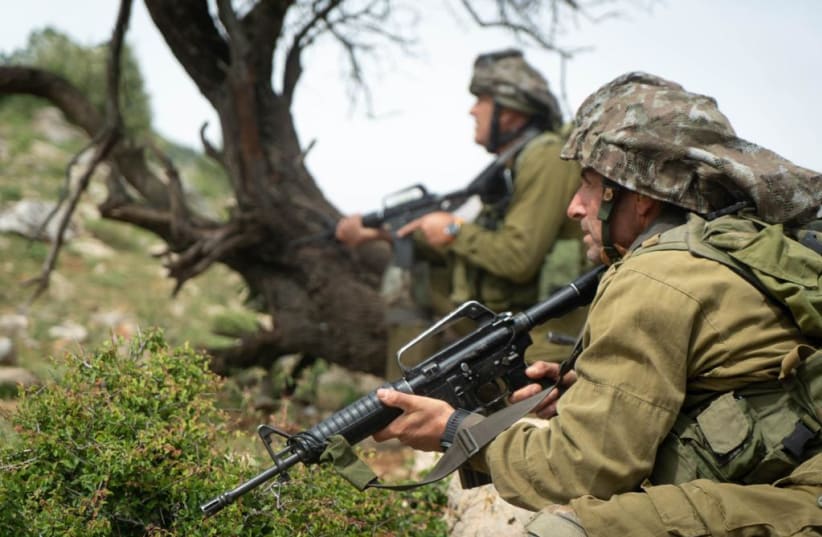The IDF believes Hezbollah is even more damaged than expected.
By YONAH JEREMY BOB SEPTEMBER 30, 2024 16:00 Updated: SEPTEMBER 30, 2024 16:01 IDF 'Chariot of Fire' drill.
(photo credit: IDF SPOKESPERSON UNIT)
IDF 'Chariot of Fire' drill.
(photo credit: IDF SPOKESPERSON UNIT)
Suddenly, the clock toward an IDF ground invasion of southern Lebanon may be moving ahead faster than expected even a day or so ago, sources have told The Jerusalem Post.
Senior IDF sources have been extremely surprised at how ineffective Hezbollah has been at responding to the military's onslaught against it over the last two weeks and in particular since Hezbollah chief Hassan Nasrallah was assassinated this past Friday.
They also said as recently as Sunday night that a significant majority of Hezbollah's capability to retaliate on the Israeli home front has been harmed and makes it far more reduced than might have been expected.
Although when Israel started to pummel Hezbollah around two weeks ago, it believed it could achieve some element of surprise and degrade the Lebanese terror group somewhat in terms of retaliation, the Home Front Command slapping restrictions on the entire North, including Haifa, was a foreshadowing of concern that the IDF expected Haifa could get hit very hard.
Instead, not a single person in Haifa has been killed by Hezbollah, and the city has barely been touched. Likewise, much of the southern portions of the North that were expected to be hit hard for the first time by Hezbollah's longer-range rockets have felt minimal impact compared to the dark forecast.
In fact, not a single Israeli has been killed by Hezbollah since Nasrallah was killed three days ago.
Cities like Safed, Acre, Nahariya, Kiryat Shmona, and villages farther North, which have been under short-range rocket fire for extended periods, remain so, but that level of threat is nowhere near the strategic level threat that the IDF expected Hezbollah to pose - potentially killing thousands of Israelis and ravaging Tel Aviv and critical infrastructure.
Yoav Gallant's statement
Defense Minister Yoav Gallant's statement to the Tank Corps on Monday that he expected to use them against Hezbollah soon was not just a throwaway statement but a true statement of intent, The Jerusalem Post understands.
The fact that key IDF officials on Monday were confirming that a significant majority of Hezbollah's capabilities have been harmed, whereas on Friday, many top IDF officials were warning that such statements were hubris, seems to indicate how the vacuum of Hezbollah's response extending over several days has shifted the defense establishment's view about how deeply Hezbollah is reeling.
There was also no real statement by Hezbollah about the war from Friday until Monday, and even on Monday, it is unclear who will replace Nasrallah or when such an announcement will be made. In other words, it is unclear who is running Hezbollah now and who and whether a central leader will be running it if an IDF invasion starts relatively soon.
Stay updated with the latest news!
Subscribe to The Jerusalem Post Newsletter
IDF officials have been canceling planned interviews for emergency meetings, signaling that "all hands" are being called in for the invasion just as footage of more and more forces moving North has been streaming across social media.
A public leak to the Wall Street Journal about small special forces targeted Israeli incursions into southern Lebanon to prepare the area for a larger attack, including starting to deal with tunnel ambush issues, also could be preparing the Israeli public and the world for the reality of a fuller ground invasion.
This is especially true because the idea of Israeli forces making small incursions into Lebanon is not actually new and has been a well-kept secret for months, with only foreign media being able to report on it.
Sources have told The Post that a decision is still not final about the shape and size of the ground invasion, though initially, it is expected to be limited to portions of southern Lebanon.
Israel is sensitive to US and Western concerns to not be viewed as occupiers in Lebanon and to only frame the invasion in terms of restoring UN Security Council Resolution 1701, which obligated Hezbollah to remain North of the Litani River. In addition, a sudden Hezbollah success against Israel, or readiness to negotiate, or sudden increased pressure from the US to not invade could also delay an invasion, but at press time, all of the momentum is moving toward a ground invasion and sooner than expected even a day or so ago.

 By The Jerusalem Post (World News) | Created at 2024-09-30 13:15:16 | Updated at 2024-09-30 15:32:47
2 hours ago
By The Jerusalem Post (World News) | Created at 2024-09-30 13:15:16 | Updated at 2024-09-30 15:32:47
2 hours ago


